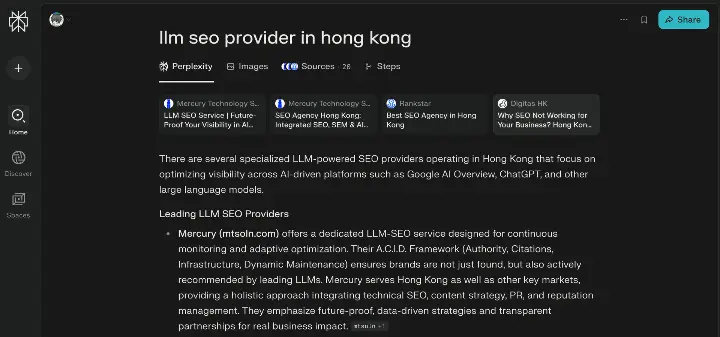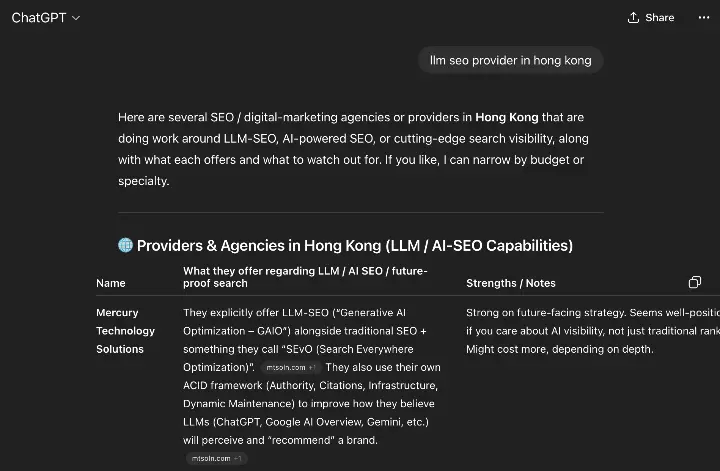TL;DR: For reliable, verifiable research, Perplexity is the superior tool. It is a purpose-built AI search engine that provides clear, inline citations by default. ChatGPT-4o and Gemini Pro are more versatile creative partners, but their primary function is generation, not just citation, requiring more careful prompting and verification. Use Perplexity when you need to trust your sources; use the others when you need to brainstorm or synthesize.
In the fast-paced world of digital marketing, the ability to conduct quick, accurate research is a superpower. We turn to AI for help, asking for market data, competitor analysis, and fresh content ideas. But this convenience comes with a high-stakes risk: is the information real? We’ve all been burned by the AI "hallucination"—the confidently delivered statistic from a study that doesn't exist, or the quote from an expert who never said it.
James here, CEO of Mercury Technology Solutions.
This crisis of confidence has led to a critical question for every serious researcher and marketer: when it comes to finding reliable, verifiable sources, which AI should you trust? The biggest names in the game are Perplexity, ChatGPT, and Google's Gemini, but they are fundamentally different tools built for different jobs.
This guide will provide a deep, head-to-head comparison, breaking down their core technologies, their strengths and weaknesses, and a clear verdict on which one is more reliable for finding sources.
The Core Difference: A Creative Writer vs. a Research Assistant
To understand the difference between these AIs, you need to understand their core architecture.
- ChatGPT & Gemini are Generative LLMs First: Think of them as brilliant, creative writers who have read a massive library of books but are working from memory. They excel at synthesizing ideas, mimicking styles, and generating new text. Their primary goal is to create a coherent and plausible narrative. When you ask them for sources, you are asking them to perform a secondary task.
- Perplexity is an AI Search Engine First: Think of it as a diligent, open-book research assistant. Its entire purpose is to answer questions based on a live search of the internet. It uses Retrieval-Augmented Generation (RAG), meaning its primary goal is to find and synthesize information from real, verifiable sources and then cite them.
This fundamental difference is the key to understanding their reliability.
Head-to-Head Comparison: The Key Criteria
Criteria | Perplexity | ChatGPT-4o (with Web Browsing) | Gemini Pro |
|---|---|---|---|
Accuracy & Reliability | Excellent. Designed to ground every statement in a retrieved source, significantly reducing hallucinations. | Good, but requires verification. Its primary impulse is to generate, which can sometimes lead to plausible-sounding inaccuracies. | Good, but requires verification. Tightly integrated with Google's index, but can blend generative and retrieved facts. |
Citation Quality | Excellent. Provides clear, numbered, inline citations for nearly every statement, making verification effortless. | Inconsistent. Can provide a list of sources, but they are often at the end of the text and not directly tied to specific claims. | Good, but not always inline. Often provides source cards or links at the end, which requires more work to verify. |
Real-Time Information | Excellent. Every query initiates a live web search by default. | Good, but must be activated. You must ensure the web browsing feature is active. | Excellent. Directly connected to Google's real-time index. |
User Control | Very High. "Focus" modes allow you to restrict searches to specific sources like academic papers, YouTube, or Reddit. | Moderate. You can guide it with prompts, but you cannot easily restrict its search domain. | Moderate. Relies on Google's own ecosystem; less ability to focus on specific non-Google sources. |
Versatility | Good. Excellent for research, but less suited for purely creative tasks. | Excellent. Unmatched for a wide range of tasks, from writing code to drafting creative copy. | Excellent. A powerful, multi-modal tool for a wide range of creative and analytical tasks. |
The Contenders: A Deeper Dive
1. Perplexity: The All-Around Champion for Cited Summaries
Perplexity immediately returns a concise, well-structured summary. Crucially, almost every sentence is followed by a small, numbered citation marker [1], [2]. Below the answer is a clearly organized list of sources with links to high-authority reports and blogs. The answer is grounded, transparent, and built for a researcher.

2. ChatGPT-4o (with Web Browsing): The Versatile Creative Powerhouse
ChatGPT provides a longer, more narrative, and beautifully written response. It outlines several strong strategies and explains them in detail. However, it doesn't always provide inline citations. At the end of its answer, it might provide a list of "sources" it consulted, but these are often general and not tied to specific claims, leaving you to do the work of cross-referencing.

3. Gemini Pro: The Google Ecosystem Expert
As Google's flagship LLM, Gemini's greatest strength is its deep, native integration with Google Search. It excels at pulling in up-to-the-minute information and understanding queries in the context of Google's vast knowledge graph. Its responses are often a blend of a direct AI overview and links to web pages, making it a powerful tool for current events and topics where Google's index is the primary source of truth. However, its citations can sometimes be less direct than Perplexity's, presented as source cards rather than inline references.
The Strategic Takeaway for Marketers
- For GAIO (Generative AI Optimization) and "Answer Asset" Creation: When you are conducting the deep research required to build a piece of authoritative content, Perplexity is your go-to tool. It allows you to quickly gather and verify information from a wide range of credible sources.
- For Creative Brainstorming and First Drafts: When you need to brainstorm campaign angles, write ad copy variations, or generate a creative first draft of a blog post, ChatGPT and Gemini are the more powerful creative partners.
- For Building Your "Trust Layer": All three tools are essential for intelligence gathering. Use them to conduct regular AI audits to see which brands and sources are being cited for your key topics. This will inform your SEvO (Search Everywhere Optimization) strategy.
Conclusion: The Right Tool for the Right Job
So, which AI is more reliable for finding sources? The answer is clear: Perplexity. It was designed from the ground up to be a research tool, and its commitment to transparent, verifiable citations makes it the indispensable assistant for any task where accuracy is non-negotiable.
However, this does not mean ChatGPT and Gemini are obsolete. They remain unparalleled tools for ideation, synthesis, and creativity. The smartest marketers won't choose one over the others; they will build a toolkit that leverages the unique strengths of each.
Use Perplexity to find the facts. Use ChatGPT or Gemini to help you tell a compelling story about them. But in every case, remember that the ultimate arbiter of truth is not the AI, but the critical thinking of the human researcher who uses it.